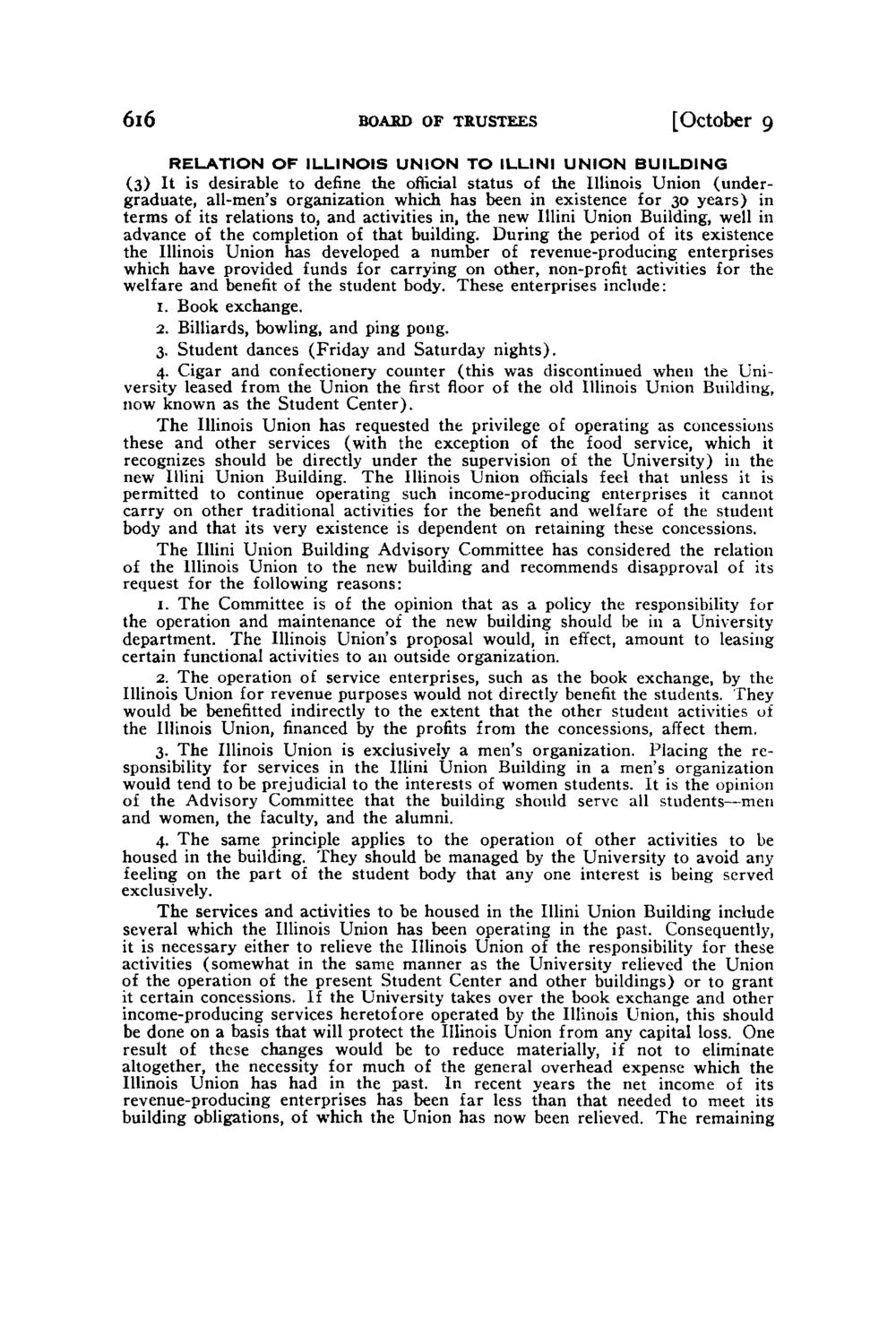| |
| |
Caption: Board of Trustees Minutes - 1940
This is a reduced-resolution page image for fast online browsing.

EXTRACTED TEXT FROM PAGE:
6i6 BOARD OF TRUSTEES [October 9 RELATION OF ILLINOIS U N I O N TO ILLINI U N I O N BUILDING (3) It is desirable to define the official status of the Illinois Union (undergraduate, all-men's organization which has been in existence for 30 years) in terms of its relations to, and activities in, the new Illini Union Building, well in advance of the completion of that building. During the period of its existence the Illinois Union has developed a number of revenue-producing enterprises which have provided funds for carrying on other, non-profit activities for the welfare and benefit of the student body. These enterprises include: 1. Book exchange. 2. Billiards, bowling, and ping pong. 3. Student dances (Friday and Saturday nights). 4. Cigar and confectionery counter (this was discontinued when the University leased from the Union the first floor of the old Illinois Union Building, now known as the Student C e n t e r ) . T h e Illinois Union has requested the privilege of operating as concessions these and other services (with the exception of the food service, which it recognizes should be directly under the supervision of the University) in the new Illini Union Building. T h e Illinois Union officials feel that unless it is permitted to continue operating such income-producing enterprises it cannot carry on other traditional activities for the benefit and welfare of the student body and that its very existence is dependent on retaining these concessions. T h e Illini Union Building Advisory Committee has considered the relation of the Illinois Union to the new building and recommends disapproval of its request for the following reasons: 1. T h e Committee is of the opinion that as a policy the responsibility for the operation and maintenance of the new building should be in a University department. T h e Illinois Union's proposal would, in effect, amount to leasing certain functional activities to an outside organization. 2. T h e operation of service enterprises, such as the book exchange, by the Illinois Union for revenue purposes would not directly benefit the students. They would be benefitted indirectly to the extent that the other student activities of the Illinois Union, financed by the profits from the concessions, affect them. 3. The Illinois Union is exclusively a men's organization. Placing the responsibility for services in the Illini Union Building in a men's organization would tend to be prejudicial to the interests of women students. It is the opinion of the Advisory Committee that the building should serve all students—men and women, the faculty, and the alumni. 4. T h e same principle applies to the operation of other activities to be housed in the building. They should be managed by the University to avoid any feeling on the part of the student body that any one interest is being served exclusively. T h e services and activities to be housed in the Illini Union Building include several which the Illinois Union has been operating in the past. Consequently, it is necessary either to relieve the Illinois Union of the responsibility for these activities (somewhat in the same manner as the University relieved the Union of the operation of the present Student Center and other buildings) or to grant it certain concessions. If the University takes over the book exchange and other income-producing services heretofore operated by the Illinois Union, this should be done on a basis that will protect the Illinois Union from any capital loss. One result of these changes would be to reduce materially, if not to eliminate altogether, the necessity for much of the general overhead expense which the Illinois Union has had in the past. In recent years the net income of its revenue-producing enterprises has been far less than that needed to meet its building obligations, of which the Union has now been relieved. T h e remaining
| |